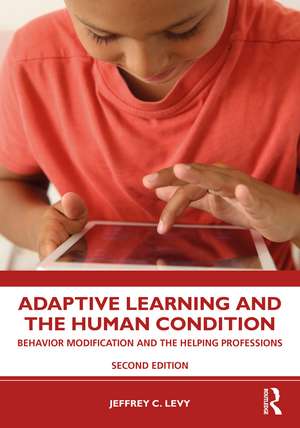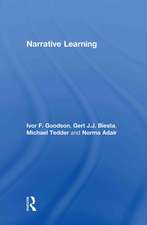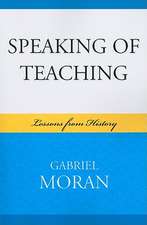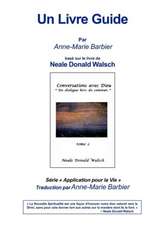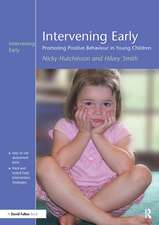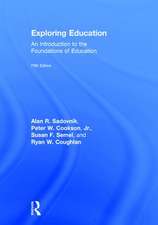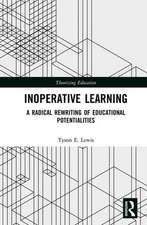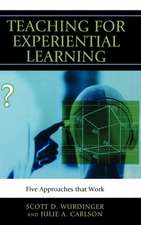Adaptive Learning and the Human Condition: Behavior Modification and the Helping Professions
Autor Jeffrey C. Levyen Limba Engleză Paperback – 30 sep 2021
Defining learning as an adaptive process enables students to understand the need to review the basic animal research literature in classical and operant conditioning and consider how it applies to human beings in our everyday lives. Divided into four parts, this book covers historical research into psychology and adaptive learning, principles of adaptive learning (prediction and control), adaptive learning and the human condition, and behavior modification and the helping professions.
The book showcases how an adaptive learning strategy can be practical, diagnostic, and prescriptive, making this an essential companion for psychology students and those enrolled in programs in professional schools and helping professions including psychiatry, special education, health psychology, and physical therapy.
Preț: 481.52 lei
Nou
Puncte Express: 722
Preț estimativ în valută:
92.16€ • 94.98$ • 77.81£
92.16€ • 94.98$ • 77.81£
Carte tipărită la comandă
Livrare economică 03-17 martie
Preluare comenzi: 021 569.72.76
Specificații
ISBN-13: 9780367366827
ISBN-10: 0367366827
Pagini: 404
Ilustrații: 346
Dimensiuni: 174 x 246 x 21 mm
Greutate: 0.74 kg
Ediția:Nouă
Editura: Taylor & Francis
Colecția Routledge
Locul publicării:Oxford, United Kingdom
ISBN-10: 0367366827
Pagini: 404
Ilustrații: 346
Dimensiuni: 174 x 246 x 21 mm
Greutate: 0.74 kg
Ediția:Nouă
Editura: Taylor & Francis
Colecția Routledge
Locul publicării:Oxford, United Kingdom
Public țintă
PostgraduateNotă biografică
Jeffrey C. Levy received the Dean's Advisory Council’s Outstanding Teacher Award, the Sears-Roebuck Award for College Teaching and Campus Leadership, and was twice nominated by Seton Hall University for National CASE Professor of the Year. Trained as an experimental psychologist with interests in behavior modification, Levy regularly taught undergraduate and graduate courses in Learning and Behavior Modification.
Cuprins
Part I: A Science of Psychology and Adaptive Learning
Chapter 1
A Science of Psychology and the Human Condition
Chapter 2
A Science of Adaptive Learning
Part II: Principles of Adaptive Learning
Chapter 3
Predictive Learning – Phenomena and Variables
Chapter 4
Predictive Learning – Theoretical Issues and Applications
Chapter 5
Appetitive Control Learning
Chapter 6
Aversive Control Learning
Part III: Adaptive Learning and Human Condition
Chapter 7
Antecedents and Control Learning
Chapter 8
Indirect Adaptive Learning
Chapter 9
Adaptive Learning and the Human Condition
Chapter 10
Problem Solving and Technology
Chapter 11
Choice and Self-Control
Part IV: Behavior Modifications and the Helping Professions
Chapter 12
Helping Professions
Chapter 13
Behavior Modification
Chapter 14
Help
Chapter 1
A Science of Psychology and the Human Condition
Chapter 2
A Science of Adaptive Learning
Part II: Principles of Adaptive Learning
Chapter 3
Predictive Learning – Phenomena and Variables
Chapter 4
Predictive Learning – Theoretical Issues and Applications
Chapter 5
Appetitive Control Learning
Chapter 6
Aversive Control Learning
Part III: Adaptive Learning and Human Condition
Chapter 7
Antecedents and Control Learning
Chapter 8
Indirect Adaptive Learning
Chapter 9
Adaptive Learning and the Human Condition
Chapter 10
Problem Solving and Technology
Chapter 11
Choice and Self-Control
Part IV: Behavior Modifications and the Helping Professions
Chapter 12
Helping Professions
Chapter 13
Behavior Modification
Chapter 14
Help
Recenzii
Praise for the first edition"The text has a focus on adaptive learning which not only underscores the relationship between operant and classical learning but highlights our individual ability to operate on and control our own environments and, thus, our own learning. Students should find this premise enormously interesting and relatable" - Margherita Rossi, Broome Community College
"I am interested! The approach appears to be unique in its focus on the adaptive function of learning, something I always emphasize in my course. I may be especially interested in this text for my graduate course in Learning, as my students are PsyD candidates. The strengths are the evolutionary emphasis and the writing style. I really liked his careful discussion of the Tolman experiment because I think it would help students understand the importance of each aspect of the design." - Cora Sherburne, IUP
"I'm intrigued by the Levy's approach to 'modernizing' the teaching of basic learning processes. I have been teaching this course for a very long time and little has been done, successfully, to deviate from the traditional approach. Levy's attempt to bring respondent and operant learning together rather than to clarify their distinctions might just work." - Kris Biondolillo, Arkansas State University
"It takes a different approach to the coverage of behavior theory in psychology by including topics that are typically not found in most textbooks (e.g., emphasis on adaptation to the environment, social learning and culture, human applications of principles of learning)." - Peter Butera, Niagara University
"The goal of the text is to bridge the gap between science and practice. My reading of the contents suggests that it goes a long way toward meeting its goal. The author seems to have arranged the text by introducing a problem with basic-science findings and then showing their relevance to applied concerns." - Daniel Cerutti, California State University East Bay
"I am interested! The approach appears to be unique in its focus on the adaptive function of learning, something I always emphasize in my course. I may be especially interested in this text for my graduate course in Learning, as my students are PsyD candidates. The strengths are the evolutionary emphasis and the writing style. I really liked his careful discussion of the Tolman experiment because I think it would help students understand the importance of each aspect of the design." - Cora Sherburne, IUP
"I'm intrigued by the Levy's approach to 'modernizing' the teaching of basic learning processes. I have been teaching this course for a very long time and little has been done, successfully, to deviate from the traditional approach. Levy's attempt to bring respondent and operant learning together rather than to clarify their distinctions might just work." - Kris Biondolillo, Arkansas State University
"It takes a different approach to the coverage of behavior theory in psychology by including topics that are typically not found in most textbooks (e.g., emphasis on adaptation to the environment, social learning and culture, human applications of principles of learning)." - Peter Butera, Niagara University
"The goal of the text is to bridge the gap between science and practice. My reading of the contents suggests that it goes a long way toward meeting its goal. The author seems to have arranged the text by introducing a problem with basic-science findings and then showing their relevance to applied concerns." - Daniel Cerutti, California State University East Bay
Descriere
This book provides a comprehensive introduction to the basic principles of classical and instrumental conditioning. This edition has been thoroughly updated throughout, relating adaptive learning principles to clinical applications as well as non-traditional topics such as parenting, moral development, and the helping professions.
